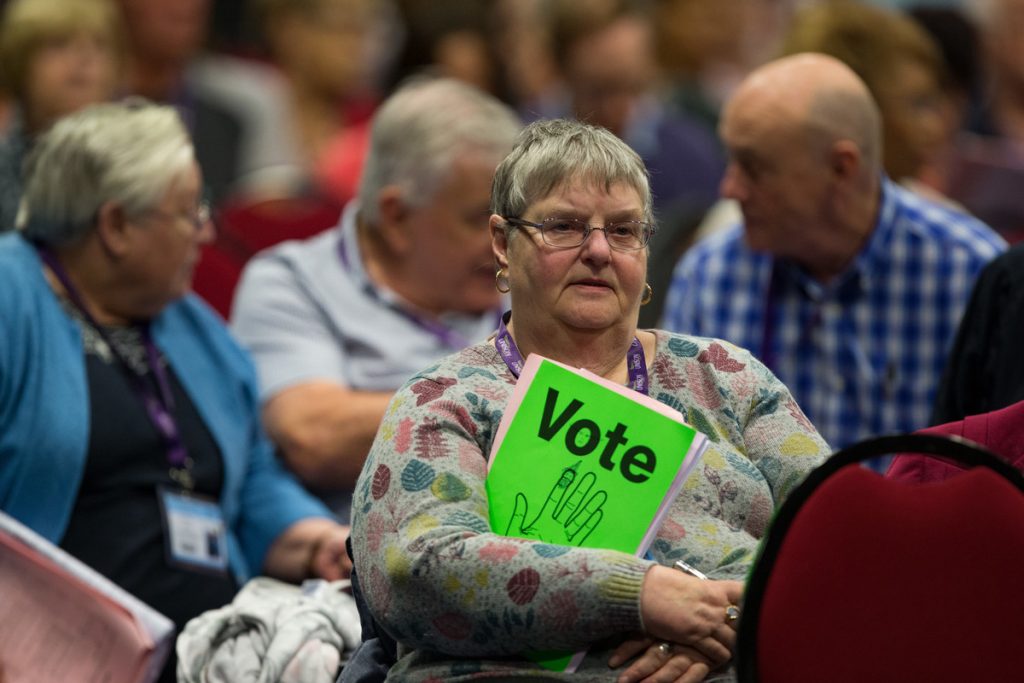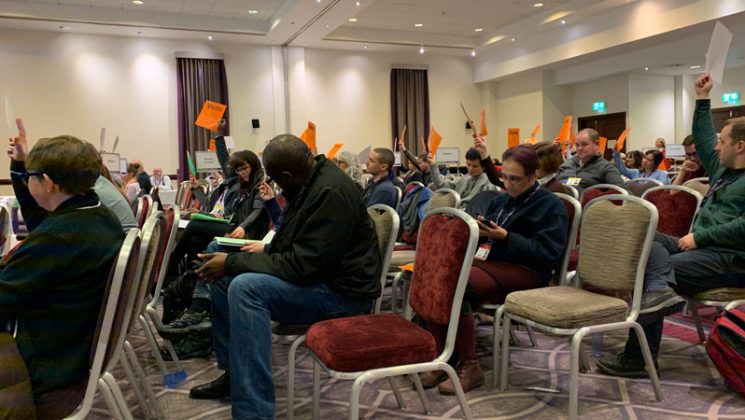Motions are your way to influence UNISON, to shape and change policy, sometimes a grassroots motion from a branch, drafted by a single member, can lead to historic changes to our campaigning and policy agenda.
What follows is a useful guide to help you write successful motions for your conference. It’s a combination of general advice for beginners, plus clarity and guidance on common issues that arise and pointers on what to avoid.
It is neither an exhaustive list of all the questions you may have or issues that may come up, nor a step-by-step instruction guide on how to submit your motion to your committee structures or through UNISON’s online conference system.
If you want further advice on motions you are planning to submit, then this is available in your region from regional council officers and your region’s standing orders committee representative.
So, first things first …
Motion titles
Have a clear title for your motion – titles cannot be amended. A clear title helps everybody involved. For instance: “A carers policy fit for purpose”, not “This inequity must stop”. A title is used as shorthand at all subsequent meetings, so it helps if everyone is clear from the start.
Write in the name of ‘conference’
If your motion is accepted onto the conference agenda and passed by conference, then it will belong to conference; it will be the collective voice and request of the entire conference – so it must be written as if the whole body of conference has written it. Phrases such as “conference notes that …” and “therefore, conference calls on …” are correct, rather than, for example, “the Bolton branch notes that”.
A motion will be ruled out of order if does not speak in the voice of the conference.
Motion structure
At a basic level, a motion must have a title and a formal instruction for the conference to carry out. However, it’s also important to have explanatory text covering what the issue is and why it is important to the conference.
Ideally, this would break down to having separate sections for:
- an introduction;
- some detail on why action is necessary;
- action sought.
Subject matter and ‘citizenship’ issues
All motions and amendments must be relevant to the conference being attended. For national delegate conference, or NDC, they must be relevant to the union as a whole. These are referred to as “citizenship” issues, rather than being issues for a service group or other smaller group.
For example, motions submitted to the retired members’ conference should be on issues that predominantly affect retired members only.

Accuracy
It’s a good idea to fact check your motion – try not to assume the state of current law, negotiations or agreed policy, etc – find out. Motions can fall if the facts are challenged.
Actions sought
Ask for clear objectives that are possible to achieve – for instance, a “review of our peace strategy” not “we demand world peace”.
Make sure the asks are being requested of the correct body for the conference you are submitting to. For instance, for NDC, the body that is being called on to act on the motion is the national executive council, where for women’s conference it will be the national women’s committee.
Calls v instructs
UNISON’s standing orders committees see a distinction between motions that call on another body or part of the union to do something and one that instructs them.
When using “instruct”, submitters of motions should be clear that the conference does indeed have the power to instruct this body and, in addition, that the body being instructed has the power to undertake or ensure the action.
Even when using “call” or “seek to ensure”, submitters should still check that the conference has the power to call on this body and the body has the power to undertake or ensure the action.
For example, if you ask that the NEC ensures a letter is received by every member, this would not be possible, as the NEC doesn’t have full control over the accurate delivery of mail. Alternative wording is usually better, such as “seek to send every member a letter”.
Devolution
Be aware that due to devolution, proposals in some motions may not apply across the UK because of devolved governmental structures. This should be reflected in the motion and particularly when asking for relevant actions.
The government
Motions can be submitted on the policy or actions of the government and/or previous governments. However, when using the word “Labour”, motions must be clear whether they are referring to past or future Labour governments or the Labour Party (see below).

Affiliated political fund
Matters affecting the Labour Party, both in relation to internal issues and matters to be pursued at Labour Party conference, are dealt with by the affiliated political fund (Labour Link), not NDC or any other conference.
Staffing matters
Any motion seeking to influence or direct matters relating to UNISON’s staffing arrangements will be ruled out of order. Staffing matters are the sole responsibility of the NEC and the general secretary.
Legal jeopardy
A motion can be ruled out of order if UNISON’s legal advisors determine that there is a risk that the wording of the motion could jeopardise either a current legal case, the reputation of the union or any future case brought against the union.
For instance, motions or amendments must not describe previous or current disputes as being “against privatisation” or similar such words, as this could leave the union open to legal challenge.
Calling for industrial action/unlawful action
Try to make sure you aren’t accidentally asking for the union to enter into unlawful industrial action. This can be a very tricky area. The NEC has exclusive power to authorise industrial action.
To be lawful, industrial action must relate to a trade dispute as defined by s.218 of the Trade Union and Labour Relations (Consolidation) Act 1992. For instance, motions calling for industrial action over privatisation or over “the cuts” do not fall in the legal definition of a trade dispute and so must not be debated, as this would put the union in legal jeopardy.
Who should submit and move the motion
There can sometimes be options of whether a branch, region or other body formally submits your motion. This will, in turn, determine who can officially “move” it at conference.
The “mover” of a motion is the person who will stand up at conference and officially start the motion debate.
Being a registered delegate does not mean you will automatically be entitled to move a motion from your region/branch/committee.
Only delegates attending in the role of the submitting body can move a motion. Delegates cannot change their delegated role to cover absent colleagues. So it is important to be very clear about the role in which you are attending conference.
For example, if the motion was submitted by your branch you can only move it if you are attending the conference explicitly in the role of “branch delegate”. If you are attending in any other role you would not be able to move the motion.
If there is no appropriate delegate present at the conference when the motion is reached on the agenda, the motion cannot be moved and will fall.
Amendments
Amendments can be difficult to get right – everyone reading an amendment will need to be able to work out what it changes about the original motion, so clarity is really important.
Identify precisely where an amendment is sought, before stating what it is. For example: “In paragraph 3. Insert after ‘faced with disciplinary action’ the words ‘including obtaining legal advice as necessary’.”
It can be helpful to then write out in full the proposed amendment. “The paragraph as amended now reads: ‘We will fully support our members faced with disciplinary action, including obtaining legal advice as necessary’.”
Amendments are not competent if they fundamentally alter or go against the spirit of the motion or don’t make sense. So where an original motion reads, “To declare Arsenal as the best team in North London” and the proposed amendment is to “delete Arsenal and replace with Spurs”, that would change the intention of the motion and would be ruled out of order.
And finally …
Rule changes
This is a big one and has led to a great deal of confusion for many submitters.
The national standing orders committee guidance states that the UNISON rule book can only be amended at NDC.
If a rule change or a new rule is required to fulfil the aims of your motion, the motion is likely to be ruled out of order.
Therefore remember to check whether your motion impacts on existing rules.
Note that recent clarification has been given that only certain bodies can submit rule changes under the online conference system and these bodies cannot be mandated or otherwise instructed to submit particular rule changes by any other body.
Happy motion writing!

